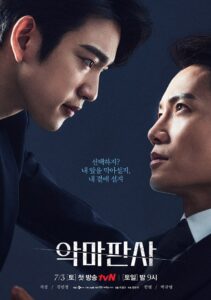
From Vincenzo to Taxi Driver, 2021 is shaping up to be the year of the anti-hero. With both shows garnering widespread acclaim, it’s become clear that rugged male leads with ambiguous morals are dominating the small screen. The Devil Judge is one of the latest additions to this roster, and with top TV veteran Ji Sung playing the titular madman, the drama manages to hold its own among stiff competition.
But The Devil Judge is also more than an anti-hero triumph. It’s a commentary on wealth and power, a parody of politics, and a reflection of society’s worst traits. The intricate arrangement of these elements, coupled with top-notch acting, moody aesthetics, and fast-paced storytelling, all make for an impressive start. Of course, it still has its share of flaws, even though they are often dwarfed by the drama’s expanse and ambition. But even then, the first half of The Devil Judge raises the bar for well-crafted dramas wishing to both educate and entertain.
In a dystopian future where riots and rampant crimes are the norm, the government decides to implement “live trials” to scare criminals and win back public favor. Citizens get to participate in high-profile cases via live streaming and voting, but the final verdict is decided by appointed judge Kang Yo-han (Ji Sung).
Yo-han may appear prudent onscreen, but behind the scenes, he is vicious and quite dramatic. In the first episode, after multiplying a five-year sentence with the number of victims, he condemns a CEO to 235 years in prison. In another episode, as punishment for countless acts of gapjil, the Minister of Justice’s son is flogged mercilessly in public. Yo-han’s methods are bold and barbaric, but they work. Citizens feel safe again. The government’s approval ratings are at a record high. Only a number of people are truly wary of the beloved judge.
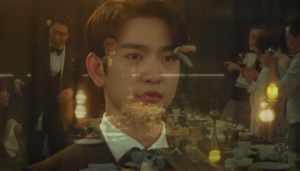
Enter rookie judge Kim Ga-on (GOT7’s Jinyoung). Virtuous and idealistic, he doesn’t buy into Yo-han’s games. Initially, he’s our stand-in, our voice of reason. He tries to dig up dirt on his boss and says what we’re feeling: “No one man should monopolize justice.” But the more he learns about Yo-han’s motives, the less certain he is about where he stands. Like Robin Hood or Batman before him, Yo-han only plays dirty against powerful people and avenges the abused. Ga-on finds — as we do — that the world can’t be so easily divided into bad and good.
When it comes to acting, it’s no wonder Yo-han’s two-faced nature is in good hands with Ji Sung. Ever the versatile actor, Ji Sung adds a necessary robustness to the volatile character. The real surprise here is Jinyoung, not because he lacks the skill, but because Ga-on could’ve very easily been overshadowed by Yo-han’s larger-than-life presence. Fortunately, with his expressive doe eyes and understated nuance, Jinyoung is convincing and immersive, which is extra-high praise for anyone going against Ji Sung. He doesn’t overact (unlike many of his peers who think that yelling always equals feelings) and reserves breaking down for the most intense of revelations, making it all the more affecting.
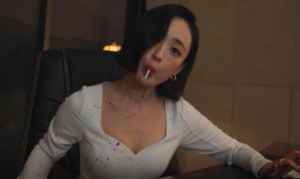
The duo is surrounded by a colorful cast of characters. Representing both the corrupt government and the slums from which she grew up is the duplicitous Sun-ah, played to eerie perfection by Kim Min-jung. Soo-hyun (Park Gyu-young), Ga-on’s childhood friend, acts as the moral compass of the drama. She is unwavering in her principles as a true-blue cop, but it would be remiss not to mention how lacking in motivation Soo-hyun is. Everything she is, does, and promises to do is for Ga-on, so it would be nice if this bad-ass fighter gets more back story in the following episodes. Deserving of a mention too is fellow associate judge Jin-joo (Kim Jae-kyung), whose transition from overenthusiastic newcomer to indignant co-worker is truly delightful.
Characters aside, perhaps the ultimate moving force of The Devil Judge is its deft, if not accurate, representation of justice, politics, and privilege. Yo-han may be deceitful, but the drama makes clear who the actual villains are: the Social Responsibility Foundation, composed of the country’s president and high-level bureaucrats and businessmen.
A major reveal in part one (and what will surely be the core of part two) is the foundation’s “House of Dreams,” a housing initiative that has been collecting billions in donations the past few years. It’s been touted as the administration’s solution to poverty, but in reality, as Yo-han is set to prove in court, it’s nothing more than a front for the foundation to pocket funds and lock up lowlifes and enemies.
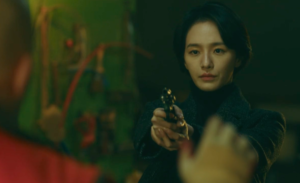
The framing of the villains is crucial here. Yes, they are hedonistic and cunning. But the problem is not just that they are a couple of bad apples, or even that Yo-han has a personal grudge against them for having a hand in his brother’s death. Rather, as Yo-han repeatedly points out, the problem is systemic. Corruption and greed are deeply entrenched in a society that has, time and again, protected the rich and maligned the poor.
It’s a radical and somewhat destabilizing idea, especially for a servant of law like Ga-on. He insists that if the court is going to expose the foundation, it should do so ethically, without stooping to their level. “Even if we hate it, that’s just how the system works,” he tells Yo-han.
But the elder judge fires back, “Is that what you tell yourself in order to live?” Soon, Ga-on finds out that the criminal behind his parents’ death has long been sneaked out of jail by the very system he defends. When the media gets hot on the House of Dreams, the president redirects public vitriol to rioters and immigrants, effectively pitting the working class among themselves.
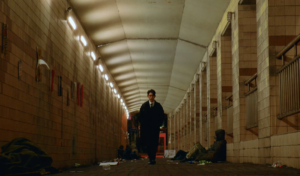
We, along with the once upright Ga-on, are now forced to ask: What does being just look like in an oppressive society? Fed up with chronic inequality, Yo-han takes justice into his own hands, even if it means breaking some laws and manipulating allies like Ga-on. In a more extreme instance, Sun-ah murders her rapist. Should they be understood or condemned? We’re not so sure anymore, as we rarely are in real life.
There are a lot of gray areas here, and it’s refreshing to see a drama tackle this head-on without preaching or moralizing. We see consequences play out, but we don’t receive sure answers, at least not yet. Soo-hyun suggests that just because a criminal has a story, “that doesn’t make [their] actions any less evil.” But by the end of part one, Ga-on, our stand-in, abandons his friend’s advice and joins Yo-han’s game. He makes sure to stand his ground, though. His boss might be fueled by revenge, but Ga-on is different. “I just want to right the world’s wrongs,” he says.
Given its heft, The Devil Judge moves at a surprisingly efficient pace. Car chases are gripping, and exposition montages are brisk but elegant, like ballet. It helps that the music, which is often either overlooked or overused in dramas, is perfectly utilized here. The bluesy rock adds to the thrill while also matching the characters’ roguishness. The aesthetics, for its part, captures the series’ moral ironies. Sometimes we’re in a stuffy Victorian home complete with Christian imagery and ornate frills. Other times we’re in a neo-noir city where slick neon and dark alleys pulsate with imminent danger.
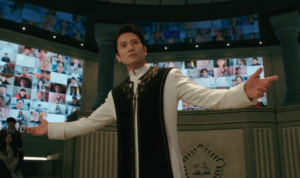
The drama has a few chinks in its armor, though. For one, while the cinematography is beautiful, the world itself doesn’t feel too far away in the future. Except for Yoh-an’s questionable rulings, a lot of the problems are so realistic, it almost seems odd to call The Devil Judge dystopian. It’s not like costume or technology help build an imagined world either. The fashion (again, aside from the court’s) is pretty standard, while mechanisms like live voting and virtual assistants currently exist, so it’s not as cutting-edge as the drama makes it out to be.
Sometimes, in its attempts to go dark, it can also betray a slight tone-deafness, like when it’s implied in episode five that Yo-han punishes a sex offender with prison rape (or at least the constant threat of it). If that’s not bad enough, the fact that the assaulters are fellow men is supposed to add to the severity of the punishment. Convict, court, and jury alike play up their disgust and laughter as lascivious caricatures of non-straight men play in front of them. It’s the one instance in the series that falls flat, not only for its off-putting depictions of rape and homosexuality, but also because it didn’t invite the same interrogation and scrutiny other mature topics had.
There’s still room for redemption, though. With eight more episodes to go, here’s hoping The Devil Judge doesn’t shy away from other worthwhile issues. As long as it continues to question itself, the drama’s abundance of moral risks seems promising. As TV critic Emily Nussbaum puts it, “There’s something to be said for a show that is potent without being perfect. [The] storytelling alters the audience by demanding that viewers do more than just watch.”
(Images via tvN. YouTube [1][2]. The New Yorker.)


